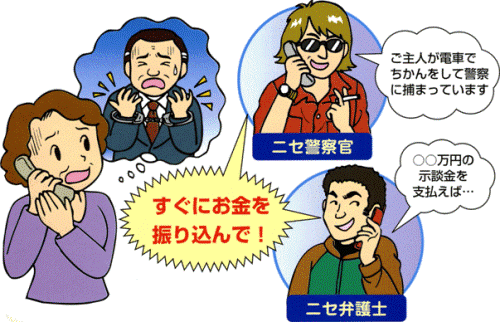So picture this. Suddenly you get a phone call, and a young voice says, “It’s me, it’s me,” as if you knew the person — well, it must be your grandson, Taro. He then tells you that he’s done something terrible, gotten into a traffic accident perhaps, and he needs $40,000 to pay off the other driver before the police become involved, so would you please go down to the bank and transfer the money to this account? Or maybe it’s a man posing as your son’s boss, who sternly tells you that your son has made an error that cost the company $50,000, which you must pay on his behalf. The most common name for these scams is Ore-ore Sagi, literally “It’s Me, It’s Me Fraud,” and the damage from these crimes this year may top the previous record of 28 billion yen ($259 million) set in 2004, which is a lot of soybeans. Now matter how much the police try to educate citizens against the dangers of believing what strangers tell them over the phone, the situations continues. Between the high number of elderly people with hundreds of thousands of dollars in cash savings and the Japanese sense of on (pronounced “own”), translatable as moral obligation to family members, it’s apparently easy for these thieves to score big. One of the regular customers at our liquor shop was nearly taken in by one of these scammers, who had researched his family extensively in order to craft more believable lies.
Why Save Him? The Doctor Who Saved Kyoani Arsonist Shinji Aoba
I watched a Japanese documentary about Takehiro Ueda, the doctor who saved the life of the Kyoani arsonist. See details...















